Want to protect your privacy as an academic? Check out our guide on the best VPNs for Academics! Choose the one that suits you.
Academics, researchers, and students have a unique set of requirements when it comes to choosing a VPN. On the one hand, they require a fast and reliable Internet service provider connection to access academic resources and conduct research.
On the other hand, they need to ensure the privacy and security of their data and online activities. With so many VPN providers available in the market, it can be a daunting task to choose the best one for academics.
The use of a VPN can provide several benefits for academics. By masking their dedicated IP address and encrypting their internet traffic, a VPN can protect them from online security threats, such as hacking and identity theft.
Additionally, it can help them bypass internet censorship and access restricted academic resources, such as journals and databases, from anywhere in the world.
However, not all VPNs are created equal. Some VPNs are known to log user data, while others have slow speeds that can disrupt academic work. That’s why it’s essential to choose a VPN that provides a balance of speed, security, and privacy.
In this guide, we’ll provide an overview of the best VPNs for academics, highlighting their key features, pros, and cons to help you make an informed decision.
Whether you’re a student, researcher, or professor, this guide will help you find the best VPN to meet your needs and help you achieve success and safety online.
Table of Contents
Top Personal VPNs For Academics
| VPN Name | Encryption Strength | Number of Servers | Logging Policy & Privacy Features | Additional Features | Average Monthly Price | Overall Rating |
| NordVPN | ⭐ 4.9 AES-256 encryption, double VPN, and Onion over VPN capabilities | 5,400+ | ⭐ 5 Strict no-logs policy, DNS leak protection, and automatic kill switch | ⭐ 5 CyberSec, Obfuscated servers, and split tunneling | 💸💸 $3.71 | ⭐ 4.9 |
| Surfshark VPN | ⭐ 4.8 AES-256 encryption and MultiHop | 3,200+ | ⭐ 5 Strict no-logs policy, MultiHop, CleanWeb | ⭐ 4 – Whitelister, HackLock, and BlindSearch | 💸 $2.49 | ⭐ 4.8 |
| ExpressVPN | ⭐ 4.7 AES-256 encryption and TrustedServer | 3,000+ | ⭐ 5 Strict no-logs policy, Trusted Server, and Network Lock | ⭐ 4 Split tunneling, MediaStreamer, and .onion site access | 💸💸💸 $6.67 | ⭐ 4.7 |
| CyberGhost | ⭐ 4.6 AES-256 encryption and kill switch | 7,400+ | ⭐ 5 Strict no-logs policy, kill switch, DNS and IP leak protection | ⭐ 4 Ad blocker, data compression, and automatic HTTPS redirection | 💸 $2.25 | ⭐ 4.6 |
| ProtonVPN | ⭐ 4.2 AES-256 encryption and Perfect Forward Secrecy | 1,259 | ⭐ 5 Strict no-logs policy, Secure Core, and Perfect Forward Secrecy | ⭐ 4 Secure streaming, TOR over VPN, and P2P support | 💸💸💸 $6.63 | ⭐ 4.2 |
| PureVPN | ⭐ 4.1 AES-256 encryption and Internet Kill Switch | 6,500+ | ⭐ 5 No-logs policy, Kill switch, and DNS leak protection | ⭐ 4 Dedicated IP, Split tunneling, and ad blocker | 💸💸 $3.33 | ⭐ 4.1 |
#1. NordVPN – Securely Access Personal Information
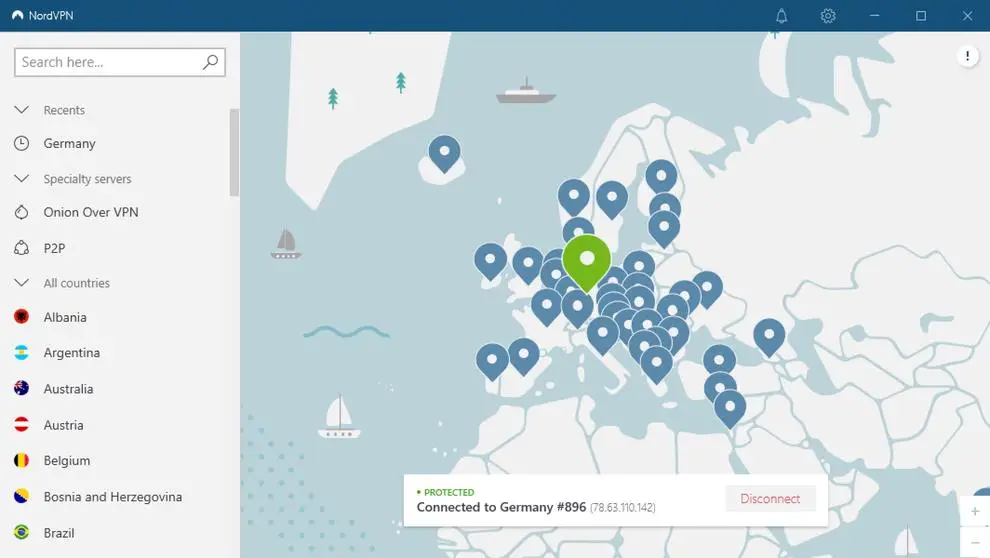
NordVPN is a popular VPN provider that offers a seamless and user-friendly experience for its users. With its intuitive software and apps, NordVPN makes it easy for users to connect to a vpn server and protect their internet traffic and personal information.
The provider offers a large network of vpn servers, fast and stable speeds, and strong encryption protocols, making it an ideal choice for academic use.
NordVPN also provides 24/7 customer support through live chat, email, and phone, which is helpful for users who encounter any issues while using the VPN. Overall, NordVPN offers a well-rounded and secure VPN experience for its users. It is also one of the best VPNs for school.
Ownership/Management: NordVPN is owned by Tefincom & Co., S.A. and is based in Panama.
Availability: App available for Android and iOS devices.
👍Pros
- Large Network of Servers: NordVPN has a large network of servers spread across the world, which makes it easy for users to access restricted academic resources and improve their streaming experience
- Strong Encryption and Security: NordVPN uses strong encryption protocols and has a strict no-log policy, which protects users’ privacy and online activities
- User-Friendly Software and Apps: NordVPN offers intuitive and user-friendly software and apps for multiple platforms, which makes it easy for users to connect to a server and manage their settings
- Fast and Stable Speeds: NordVPN provides fast and stable speeds, which are ideal for academic use and online streaming
👎Cons
- Some Slower Speeds: While NordVPN provides fast and stable speeds, some users may experience slower speeds depending on the server location and their internet connection
- Higher Cost: NordVPN is more expensive than some other VPN providers, which can be a barrier for users with a limited budget
💸Pricing
NordVPN offers several pricing plans, including a monthly plan, a 6-months plan, a 1-year plan
- 1 month: $11.95
- 6 months: $9/month
- 1 year: 6.99/month

#2. Surfshark – Protect Your Data Online
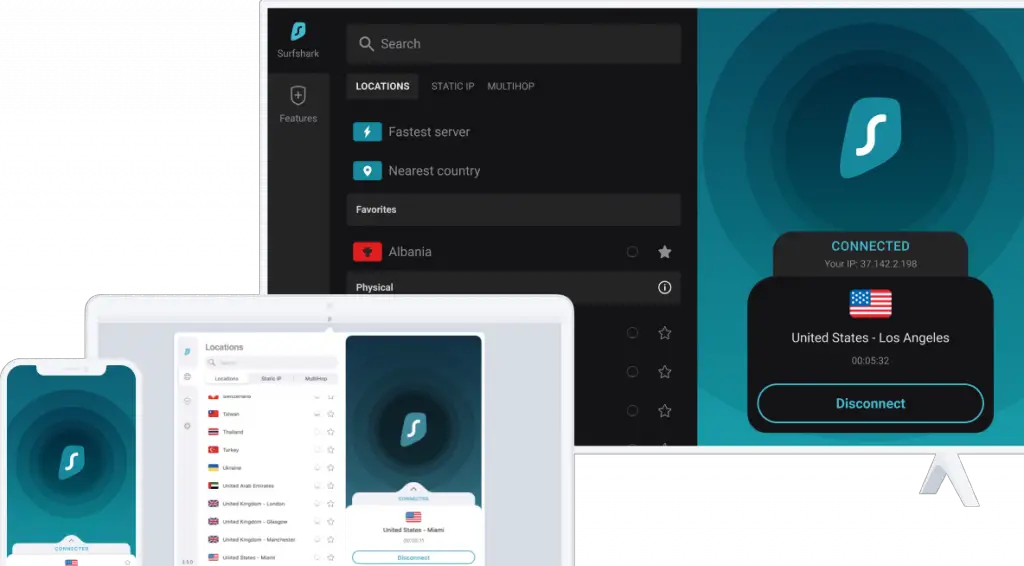
Surfshark is a VPN provider that offers an excellent user experience for its customers. With its easy-to-use software and apps, Surfshark makes it simple for users to connect to a server and protect their internet traffic and personal information.
The provider has a large network of servers, providing fast and stable speeds for academic use and online streaming. Surfshark also offers 24/7 customer support through live chat, email, and phone, which is helpful for users who need assistance with the VPN.
Additionally, Surfshark provides strong encryption protocols and a strict no-log policy, ensuring the privacy and security of its users. Overall, Surfshark provides a great user experience for its customers at an affordable price.
Ownership/Management: Surfshark is a VPN service located in the Netherlands. In 2021 Surfshark merged with Nord Security. However, both companies still operate independently.
Availability: App available for Android and iOS devices.
👍Pros
- Affordable Cost: Surfshark is one of the most affordable VPN providers, making it accessible for users with a limited budget
- Large Network of Servers: Surfshark has a large network of servers spread across the world, which makes it easy for users to access restricted academic resources and improve their streaming experience
- Strong Encryption and Security: Surfshark uses strong encryption protocols and has a strict no-log policy, which protects users’ privacy and online activities
- User-Friendly Software and Apps: Surfshark offers intuitive and user-friendly software and apps for multiple platforms, which makes it easy for users to connect to a server and manage their settings
👎Cons
- Some Slower Speeds: While Surfshark provides fast and stable speeds, some users may experience slower speeds depending on the server location and their internet connection
- Limited Server Options in Some Regions: Surfshark has a limited number of servers in some regions, which may limit users’ options for accessing restricted academic resources
💸Pricing
Surfshark offers several pricing plans, including a monthly plan, a 12-month plan, and a 24-month plan
- 24-month subscription: $2.39/month
- 12 months: $3.99/month
- 1-month: $12.95
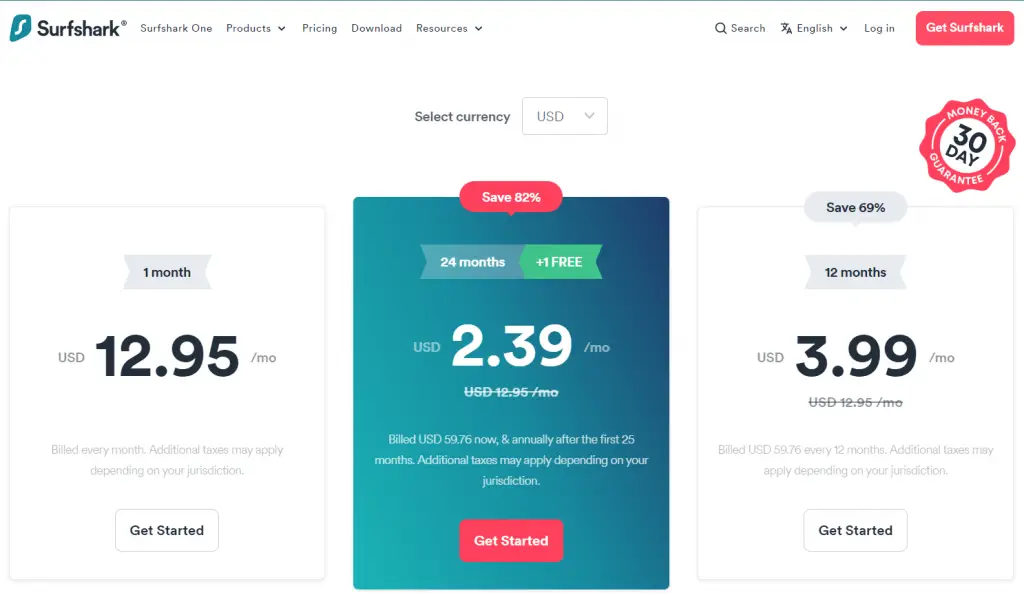
#3. ExpressVPN – Private And Secure Internet Access Worldwide
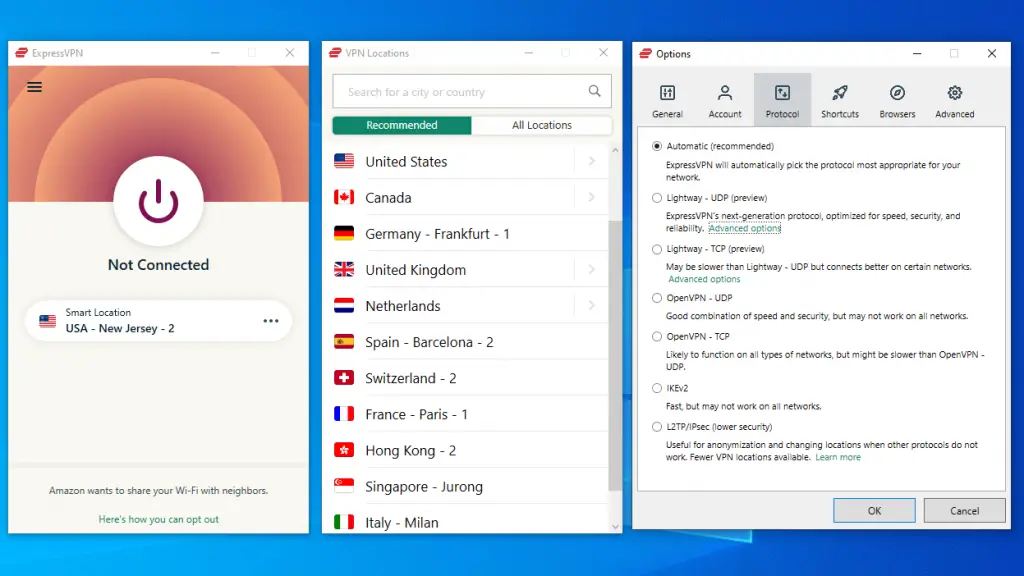
ExpressVPN is a premium VPN provider that offers a top-notch user experience for its customers. With its fast and reliable servers, ExpressVPN makes it easy for users to protect their internet traffic and personal information.
The provider’s software and apps are intuitive and user-friendly, with simple and straightforward controls that make it easy to connect to a server and manage settings.
ExpressVPN also offers 24/7 customer support through live chat, email, and phone, which is helpful for users who need assistance with the VPN. In addition, ExpressVPN provides fast and stable speeds, making it a great choice for academic use and online streaming.
Overall, ExpressVPN provides an exceptional user experience for its customers.
Ownership/Management: ExpressVPN is owned by Kape Technologies, a United Kingdom-based company. Kape develops and distributes a variety of digital products in the online security and privacy space, as well as data-powered, consumer-focused privacy and security content.
Availability: App available for Android and iOS devices.
👍Pros
- Fast and Reliable Servers: ExpressVPN has a network of fast and reliable servers that provide fast and stable speeds for academic use and online streaming
- Strong Encryption and Security: ExpressVPN uses strong encryption protocols and has a strict no-log policy, which protects users’ privacy and online activities
- User-Friendly Software and Apps: ExpressVPN offers intuitive and user-friendly software and apps for multiple platforms, which makes it easy for users to connect to a server and manage their settings
- 24/7 Customer Support: ExpressVPN provides 24/7 customer support through live chat, email, and phone, which is helpful for users who need assistance with the VPN
👎Cons
- Higher Cost: ExpressVPN is more expensive than some other VPN providers, which can be a barrier for users with a limited budget
- Some Slower Speeds: While ExpressVPN provides fast and stable speeds, some users may experience slower speeds depending on the server location and their internet connection
💸Pricing
- ExpressVPN offers several pricing plans, including a monthly plan, a 6-month plan, and a 12-month plan
- 1 month: $12.95
- 6 months: $9.99/month
- 1 year: 6.67/month
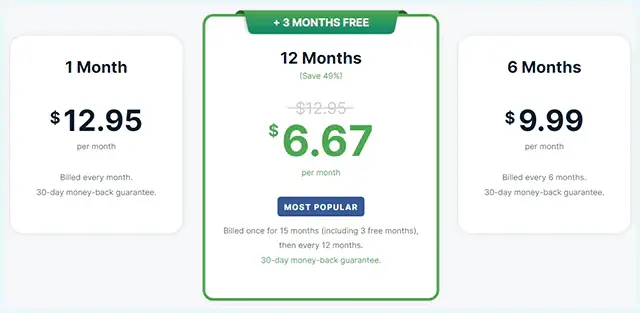
#4. CyberGhost – Keep Your Internet Activity Hidden
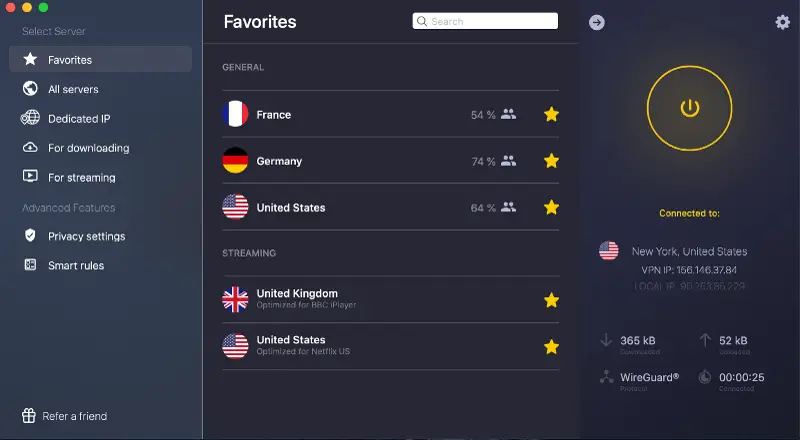
CyberGhost is a virtual private network (VPN) service that aims to provide its users with a simple, secure, and private online experience. With its user-friendly interface and one-click setup, CyberGhost makes it easy for users to encrypt their internet connection and protect their online privacy.
The service offers a wide range of features such as military-grade encryption, automatic kill switch, and dedicated IP addresses, along with access to a large network of servers in over 90 countries.
CyberGhost also provides 24/7 customer support and a 45-day money-back guarantee to ensure users have a positive experience with the service. Overall, CyberGhost aims to offer a reliable VPN solution to protect users’ online privacy and freedom.
Ownership/Management: CyberGhost is owned by Kape Technologies and is based in the United Kingdom.
Availability: App available for Android and iOS devices.
👍Pros
- Large Server Network: CyberGhost offers access to a large network of servers in over 90 countries, allowing users to unblock content from anywhere in the world
- User-Friendly Interface: CyberGhost has a user-friendly interface that is easy to use and navigate, making it accessible to even non-technical users
- Advanced Security Features: CyberGhost provides military-grade encryption, automatic kill switch, and dedicated IP addresses, among other security features, to ensure users’ online privacy and security
- Wide Range of Platform Support: CyberGhost supports a wide range of platforms including Windows, Mac, iOS, Android, and more, making it a versatile VPN solution for a variety of devices
- 24/7 Customer Support: CyberGhost offers 24/7 customer support through live chat, email, and ticket support, ensuring users can get help whenever they need it
👎Cons
- Speed: Some users have reported slower speeds with CyberGhost, especially when connecting to servers located far from their current location
- Logging Policy: CyberGhost’s logging policy has been a source of concern for some users, as the company does keep some connection logs for troubleshooting purposes
- Price: Although CyberGhost offers affordable pricing plans, some users may still find it more expensive than other VPN services in the market
💸Pricing
- 1-Month Plan: CyberGhost’s 1-month plan costs $12.99 per month and offers access to all servers and features
- 1-Year Plan: The 1-year plan costs $4.29 per month and offers a total savings of 54% compared to the monthly plan
- 2-Year Plan: The 2-year plan costs $3.25 per month and offers a total savings of 72% compared to the monthly plan
- 3-Year Plan: The 3-year plan costs $2.29 per month and offers a total savings of 83% compared to the monthly plan

#5. ProtonVPN – Keep Your Browsing Private
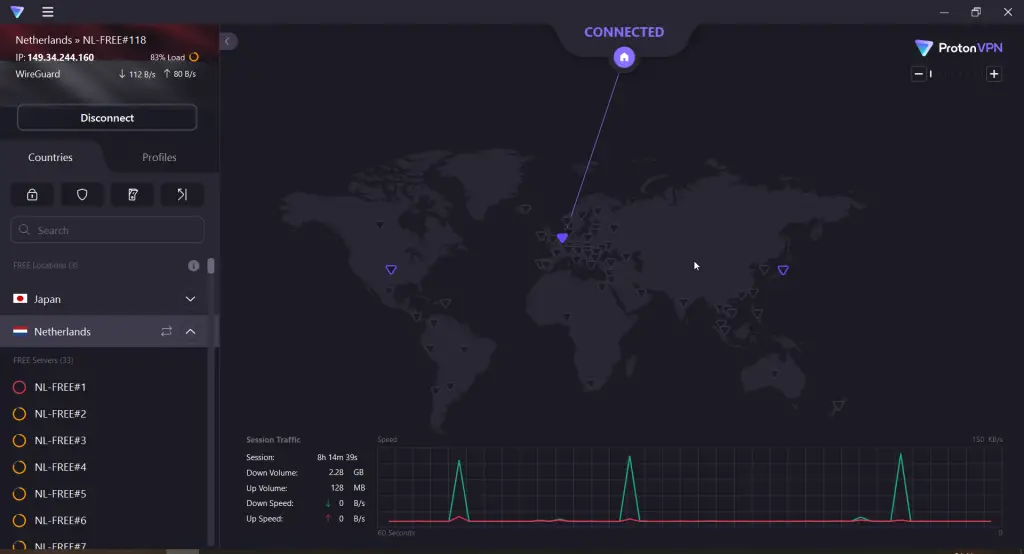
ProtonVPN Free is a free version of the ProtonVPN virtual private network (VPN) service that provides users with a secure and private internet connection.
The service offers basic VPN protection, encrypting users’ online activity and hiding their IP address, location, and personal information from being tracked or monitored. ProtonVPN Free has a simple and intuitive interface, making it easy for users to connect and use the VPN.
With its focus on privacy and security, ProtonVPN Free provides users with a reliable and user-friendly VPN experience, allowing them to browse the internet safely and securely.
However, it should be noted that the free version of ProtonVPN has certain limitations, such as lower speeds and fewer server locations, compared to the paid plans.
Ownership/Management: ProtonVPN is owned by Proton Technologies AG and is headquartered in Geneva, Switzerland.
Availability: App available for Android and iOS devices.
👍Pros
- Strong privacy focus: ProtonVPN places a strong emphasis on privacy, with a no-logs policy and advanced security features
- User-friendly: The VPN service has a simple and easy-to-use interface, making it accessible to a wide range of users
- Free option: The free version of ProtonVPN provides users with basic VPN protection, allowing them to try out the service before committing to a paid plan
👎Cons
- Limited features: The free version of ProtonVPN has limited features compared to the paid plans, such as lower speeds and fewer server locations
- Bandwidth restrictions: The free version of ProtonVPN has a lower data allowance compared to the paid plans, making it unsuitable for heavy-duty activities such as streaming and downloading
- Ad-supported: The free version of ProtonVPN is supported by ads, which can be intrusive for some users
💸Pricing
- Free: The free version of ProtonVPN provides users with basic VPN protection and unlimited bandwidth
- 1-month plan: $9.99
- 1-year plan: $5.99
- 2-year plan: $4.99

#6. PureVPN – Hide Your Information
PureVPN is a virtual private network (VPN) service that aims to provide its users with a secure and private browsing experience. With its user-friendly interface, PureVPN makes it easy for users to connect to servers around the world and encrypt their internet connection.
The service also offers additional features such as split tunneling, unlimited bandwidth, and 24/7 customer support to enhance the user experience. Overall, PureVPN aims to deliver a fast and reliable VPN experience to protect users’ online privacy and freedom.
Ownership/Management: PureVPN is owned by GZ Systems Limited and is headquartered in Hong Kong.
Availability: App available for Android and iOS devices.
👍Pros
- Large Server Network: PureVPN has a large server network that spans across 140+ countries, allowing users to access content from anywhere in the world
- User-Friendly Interface: PureVPN’s interface is intuitive and easy-to-use, making it accessible to even non-technical users
- Advanced Security Features: PureVPN offers a range of security features such as military-grade encryption, kill switch, and split tunneling to ensure users’ privacy and security
- Affordable Pricing Plans: PureVPN offers flexible and affordable pricing plans that cater to a wide range of users’ needs and budgets
- 24/7 Customer Support: PureVPN offers 24/7 customer support through live chat, email, and ticket support, ensuring users can get help whenever they need it
👎Cons
- Speed: Some users have reported slow speeds with PureVPN, especially when connecting to servers located far from their current location
- Logging Policy: Although PureVPN claims to have a no-logging policy, some users may still have concerns about their privacy and security
- Connection Stability: Some users have reported occasional connection drops, which can be a major inconvenience when trying to access sensitive information online
💸Pricing
- 1-Month Plan: PureVPN’s 1-month plan costs $10.95 per month and offers access to all servers and features
- 6-Months Plan: PureVPN’s 6-months plan costs $8.33 per month and offers access to all servers and features
- 1-Year Plan: The 1-year plan costs $5.82 per month and offers a total savings of 46% compared to the monthly plan
- 2-Year Plan: The 2-year plan costs $3.33 per month and offers a total savings of 69% compared to the monthly plan
- 5-Year Plan: The 5-year plan costs $2.10 per month and offers a total savings of 81% compared to the monthly plan
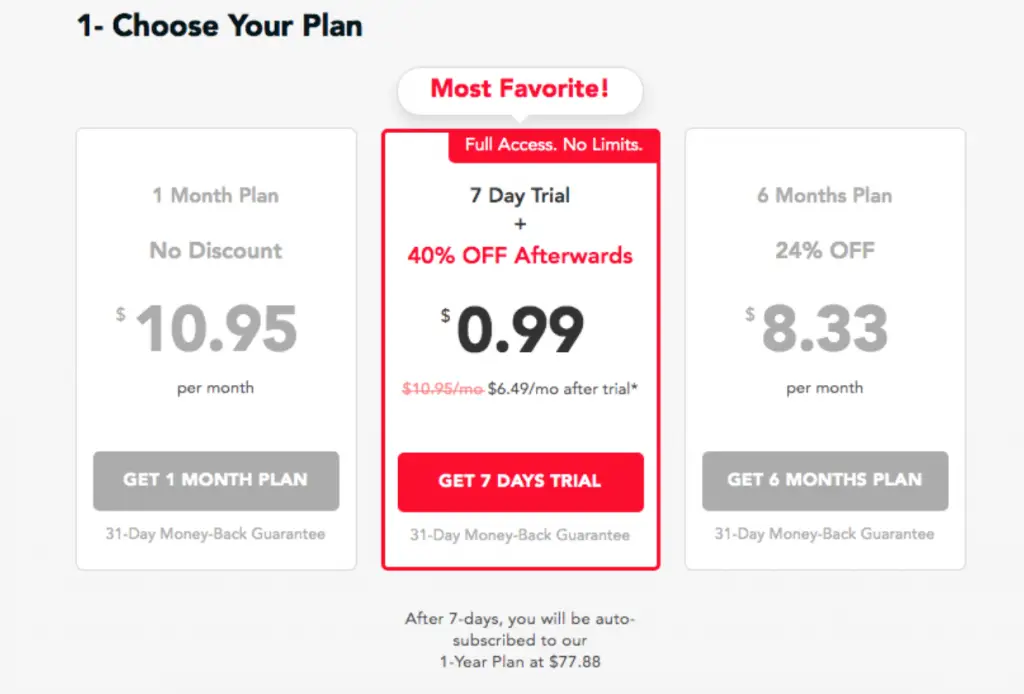
Pros and Cons of Using VPNs
Pros:
- 👍Privacy and Security: VPNs encrypt your internet web traffic and protect your personal information and online activities from being tracked or monitored.
- 👍Access to Restricted Resources: VPNs can help you bypass censorship and access restricted academic resources, such as journals and databases, from anywhere in the world.
- 👍Protection from Online Threats: VPNs can protect you from online security threats, such as hacking and identity theft, by masking your IP address and encrypting your internet traffic.
- 👍Improved Streaming Experience: VPNs can help you access geo-restricted content and improve your streaming experience by unblocking popular streaming services, such as Netflix, Hulu, and Amazon Prime.
Cons:
- 👎Slow Speeds: VPNs can slow down your internet connection, especially if the VPN provider has a limited network of servers or if you’re connected to a server that is far away.
- 👎Limited Compatibility: Some VPNs may not be compatible with certain devices or operating systems, which can limit their use and functionality.
- 👎Cost: VPNs can be expensive, especially if you opt for a premium service with advanced features.
- 👎Reliance on VPN Provider: VPNs rely on the VPN provider to maintain their privacy and security. If the VPN provider is hacked or logs your data, your privacy and security can be compromised.
- 👎Technical Knowledge: Setting up and using a VPN can be complex and requires a certain level of technical knowledge. This can be especially challenging for those who are not tech-savvy.
Other Cyber Security Tools to Consider
As you use a VPN to protect your online privacy and security, there are other cyber security tools that can also help keep you safe online. These tools include:
- Password Managers: Password managers store all of your login credentials for different websites and services in one secure location, helping you to use strong, unique passwords and prevent password reuse. (Example: NordPass)
- Antivirus Software: Antivirus software is designed to protect your devices from malware and other cyber threats. It scans your system for viruses and other malicious software, and can help to prevent attacks before they occur. Consider VPN packages that include antivirus to save up money.
- Two-Factor Authentication (2FA): Two-factor authentication adds an extra layer of security to your login process by requiring users to provide two forms of identification, such as a password and a verification code sent to your phone or email.
- Firewalls: Firewalls monitor incoming and outgoing network traffic and block any unauthorized access to your computer or network, helping to prevent hackers and other cyber criminals from gaining access to your system.
- Data Removal Services: Data removal services such as Incogni RS can help you request that websites and online services remove your personal data and other sensitive information that may have been collected about you, helping to protect your privacy and prevent your personal information from being used for malicious purposes.
By using a combination of a VPN, password manager, antivirus software, 2FA, firewall, and data removal services, you can enhance your online privacy and security and help protect your sensitive information and research data from cyber threats.
Final Thoughts
As you work and communicate online, it’s important to protect your online privacy and security from cyber threats. One way to do this is by using a VPN service, which can help to encrypt your internet connection, hide your online activity, and prevent your personal information from being exposed.
We’ve covered a selection of the best VPN service providers for academics, including NordVPN, ExpressVPN, and Surfshark. These VPN services offer a range of features and benefits, such as fast speeds, strong encryption, and user-friendly interfaces.
When choosing a VPN service, it’s important to consider factors such as security, privacy, speed, and ease of use. You should also think about your specific needs and preferences, such as whether you need a VPN for remote work, research, or streaming.
Overall, using a VPN can help academics to stay safe and secure online, protect their sensitive research data, and keep their personal information private. By using one of the best VPN service providers, you can ensure that you have a reliable and effective tool for safeguarding your online activity.
You might also be interested in the below articles:
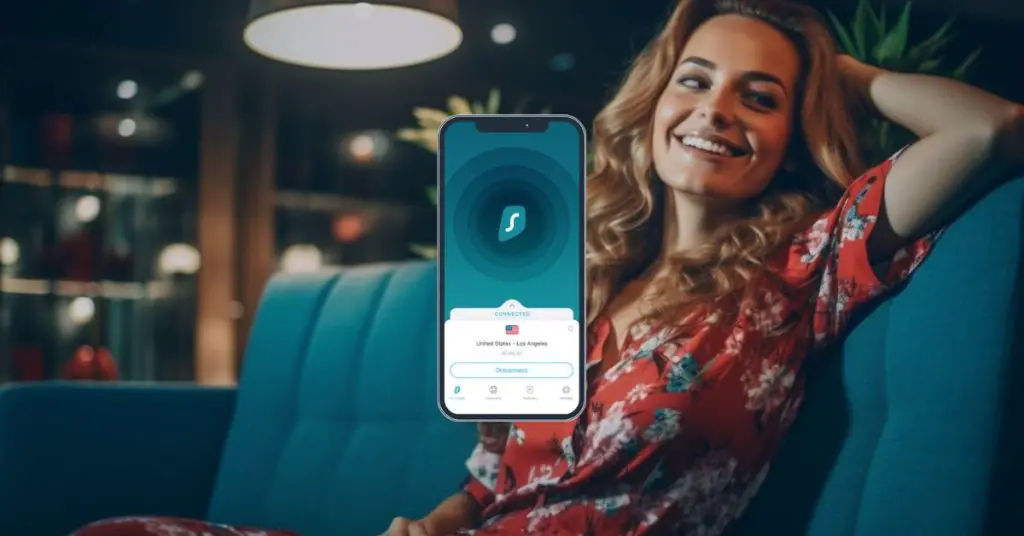



Q&As
Q1. How can I access academic resources that are restricted based on my location?
A: A VPN can help you access academic resources that are restricted based on your location by allowing you to connect to a server in a location where the resource is accessible. This will make it appear as if you are located in that country or region, allowing you to access the restricted content.
Q2. How can I protect sensitive research data when working remotely?
A: A VPN can help you protect sensitive research data when working remotely by encrypting your online activity and creating a secure and private connection between your device and the internet. This will help prevent third parties from intercepting your data and compromising its confidentiality.
Q3. Can a VPN help prevent cyber attacks on academic institutions?
A: Yes, a VPN can help prevent cyber attacks on academic institutions by encrypting data sent between devices, providing secure access to internal resources, and reducing the risk of man-in-the-middle attacks.
Additionally, VPNs can help prevent unauthorized access to network resources and limit exposure to external threats.
Q4. How can a VPN help me avoid government surveillance while conducting research in certain countries?
A: A VPN can help you avoid government surveillance while conducting research in certain countries by encrypting your online activity and providing a secure and private connection to the internet. By using a VPN, your online activity and location are hidden, making it more difficult for governments or other entities to track your activity or restrict your access to information.
Q5. What VPN features are important for academic researchers and students?
A: Some important VPN features for academic researchers and students include strong encryption, a strict no-logs policy, a large number of server locations, support for multiple devices and operating systems, and fast and reliable performance.
Additionally, features such as split tunneling, ad blocking, and malware protection can also be helpful for academic users.
Q6. What do VPN features such as Double-VPN servers, Obfuscated servers mean? Why they matter?
-Strong encryption: This is essential for protecting sensitive research data from cyber threats, ensuring that all online activity is secure and private.
-Strict no-logs policy: A VPN provider that does not collect or store logs of users’ online activity or personal information is important for ensuring user privacy and security.
-Large number of server locations: This allows users to access academic resources and data from around the world, as well as bypassing geo-restrictions on certain content.
-Multi-device support: As academic users may work across multiple devices, a VPN that supports multiple devices is crucial for seamless and secure access to academic resources.
-Split tunneling: This feature allows users to choose which applications or websites go through the VPN connection, while other traffic is sent through the regular internet connection. This can be useful for academic users who need to access both local and remote resources simultaneously.
-Ad and tracker blocking: This feature can help improve online privacy by preventing advertisers and other third-party trackers from monitoring users’ online activity.
-Malware protection: A VPN with built-in malware protection can help protect academic users from online threats, such as phishing attacks and viruses.
-Double-VPN servers: This encrypts and routes traffic through two VPN servers, making it more difficult for online snoops to track users’ activities.
-Tor-over-VPN servers: This combines the anonymity of the Tor network with the security and privacy of a VPN, making it an important feature for academic users who need to conduct research in countries with strict internet censorship.
-Obfuscated servers: These make VPN traffic look like HTTPS encrypted traffic, allowing users to get around blocks and restrictions, which is important if you need a VPN for countries with strict internet censorship like China.
Q7. What are the Best VPNs that Still Work in China?
According to our research and independent review sites such as Retore Privacy, these VPNs still work in China.
-NordVPN
-Surfshark VPN
-VyprVPN
-VPN.ac
-ExpressVPN
Q8. How did we decide which VPN to include and which to exclude in this article?
The VPNs included in the article were selected based on a variety of factors, including popularity, reputation, pricing, and features.
Each VPN was researched and evaluated based on a set of criteria, including encryption strength, number of servers, logging policy and privacy features, additional features, and overall rating.
The VPNs with the highest ratings and the most desirable features were included in the article, while those with lower ratings or fewer features were excluded. Additionally, the article was focused on VPNs that would be useful for academic users, so VPNs that were specifically marketed to academic users or had features that would be particularly useful for academic research were given preference.
Q9. Why is our review trustworthy?
Our review is trustworthy because it is conducted independently and without bias towards any particular VPN company or product. While it is impossible to avoid all conflicts of interest, we take every possible step to ensure that our evaluations are impartial and unbiased.
In an industry that is becoming increasingly consolidated, with large tech and VPN companies acquiring smaller competitors, it is important to maintain an independent and unbiased perspective.
For example, j2 Global owns PCMag, Mashable, and IGN, while Kape has purchased vpnMentor and Wizcase, and j2 Global has also purchased IPVanish, StrongVPN, Encrypt.me, SaferVPN, and more.
This consolidation can create potential conflicts of interest and impact the impartiality of reviews conducted by these companies. However, we are committed to maintaining our independence and providing our readers with accurate and unbiased evaluations.
While we may earn commissions if you purchase VPNs mentioned in our article, we do not accept any funding or compensation from VPN providers in exchange for favorable reviews. Our evaluations are based solely on our own research and analysis, and we strive to provide our readers with the most reliable and objective information possible.


